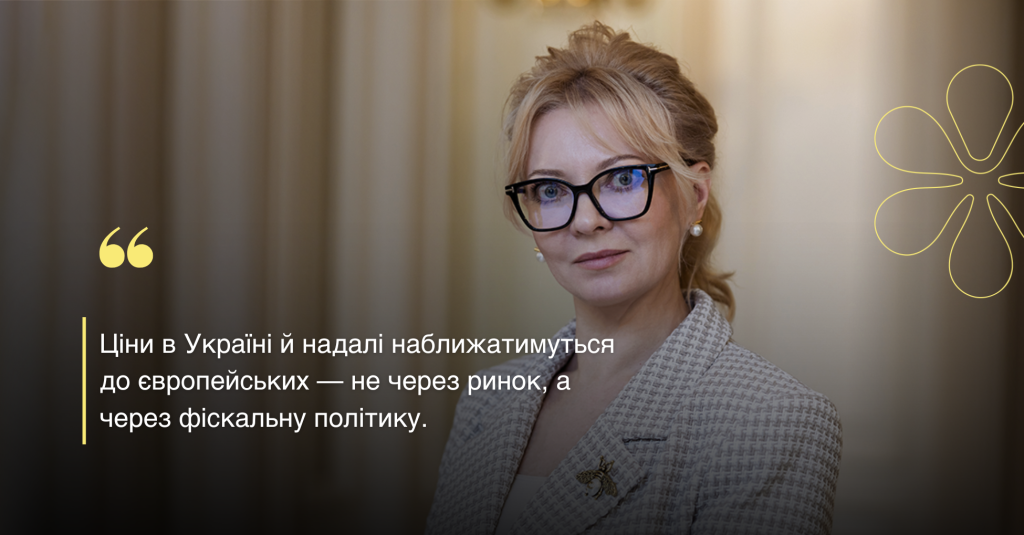Today, Ukraine is a country that is simultaneously adapting to new European standards while continuing to live under the conditions of war. In this context, the issue of fuel prices transforms from a day-to-day concern into a strategic matter. It is important not only to count the hryvnias displayed on gas station signs but also to understand the reasons and trends shaping those numbers.
European Excise Duties — A Ukrainian Outlook
“Fuel prices in Ukraine are still lower than in most European countries. For example, A-95 gasoline in Ukraine costs around €1.28 per liter, while in Germany it’s over €1.60. This is due to lower excise tax rates” noted Tetiana Dumenkova on the “My Ukraine Plus” TV channel. However, Ukraine’s European development path requires the country to harmonize its tax policies. By 2028, excise rates will gradually increase — a provision already embedded in Ukrainian legislation.
For comparison: in EU countries, average rates are €552/1,000 liters (gasoline), €400–450/1,000 liters (diesel), and around €105/1,000 liters (LPG). In the EU, excise tax accounts for up to 40–50% of the fuel price. In Ukraine, it is currently less than 30%, but this share is increasing annually.
For consumers, this means fuel will become more expensive. For businesses, it means growing financial burdens that must be considered in planning and pricing. Fuel prices in Ukraine will continue moving closer to European levels — not due to market conditions, but because of fiscal policy.

Taxes and New Regulations: Stability Without Predictability
As of 2024, a fixed advance profit tax is in effect for the industry, which must be paid regardless of actual income. This creates additional pressure, especially on small and medium-sized businesses — the backbone of regional fuel infrastructure.
And this is not the only change that affects, and will continue to affect, fuel prices for end consumers.
In the near future, the market will face new challenges, including:
• A law on strategic fuel reserves;
• Increased excise duty burden;
• Fluctuations in the euro (the currency in which excises are denominated);
• Potential increases in logistics costs.
In the short term, Ukrainians may see a slight decrease in fuel prices — up to ₴1.5 per liter. The reasons: a stable exchange rate and a temporary decline in oil prices. However, long-term trends remain unchanged: rising excise taxes, new legislative requirements for strategic reserves, and global inflation are all contributing to a gradual upward trend in fuel prices. According to National Bank forecasts, price growth will exceed 13% in 2025–2026.
Consumers Deserve to Know What They’re Paying For
Fuel prices cannot be predicted with absolute accuracy. They are shaped by the cost of oil, exchange rates, the geopolitical situation, regulatory actions, logistics, and fiscal policy. It’s a complex system where every component matters, making predictability in decision-making the key to stability.
Every driver has the right to quality fuel, fair pricing, and reliable information. Only an informed consumer can influence the quality of service they receive. And only stable regulation allows businesses — both large and small — to focus not on survival, but on growth.
Our Principle — Fair Rules of the Game
Fuel market dynamics are about more than just prices. Clear rules, a stable tax environment, predictable decisions, and cooperation with the state are essential. Businesses are ready to invest — in quality, in safety, in reserve stockpiles. But in return, they expect a partnership from the government. The Fuel and Energy Business Association always advocates for a civilized market model. At the center of this model is not just numbers — but responsibility to society and the country.
For Ukrainian businesses, especially small and medium-sized enterprises, it is crucial that the market remains predictable and transparent. These companies sustain the economy and provide thousands of jobs in the regions.
Every Ukrainian driver deserves to know what they are paying for — and to trust in transparent pricing. That’s why we are committed to making the fuel market not only stable but also fair and understandable for everyone.
Tetiana Dumenkova
Deputy Head of the Fuel and Energy Business Association

